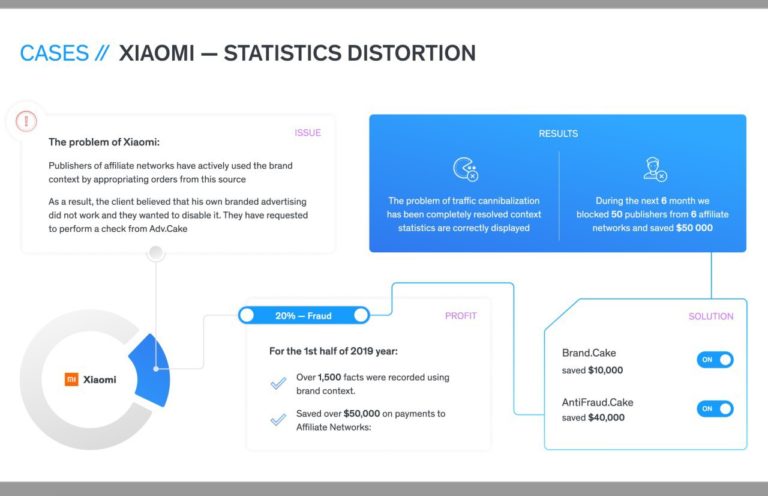30-second summary:
- Xiaomi tried to manage its own context advertisements, however, noticed a very poor performance and low conversion rates.
- After the analysis of Adv.Cake, it was found that Xiaomi’s affiliate ads had been on the top Google positions. Websites with various promo codes, cashback and other user-catching attention schemes have been placed above the official Xiaomi context ads.
- After Adv.Cake started to identify and to block various webmasters that feature coupons and cashback, the brand own context ad has become way more effective.
- Adv.Cake’s anti cookie stuffing technology blocked 50 publishers from six affiliate networks and saved $50 000 for Xiaomi.
Online shopping has become a massive industry and it is more efficient than ever for the companies thanks to brands like Adv.cake. Аffiliate fraud or cookie-stuffing most often focuses on schemes that find users who were already on the verge of making purchases.
Through such methods, rogue affiliates claim commission on purchases that were going to occur anyway, even though the affiliate did not genuinely cause or encourage these purchases.
What do we exactly mean?
In a Google search box, the user enters the brand name, for example, “buy ASOS winter jackets”. The user is already loyal to the “ASOS” brand and such a request is usually associated with a relatively high conversion rate of 10-15% (the user actually buys the product).
This is because the request has been formulated with a brand name already and is not coming from a third party source or some other low-quality traffic where conversion is typically between 0.1-1%.
The difference is huge: conversion rates for the branded requests are 10 to 100 times higher than from elsewhere.
What is the problem?
The contextual ads from different cities can be in a higher Google position than the ads of the official website. The products purchased through the affiliate links, coupon websites and other “cash-back sites” mean high expenses for the brand itself.
Such purchases turn out to be few times more expensive for the official website. Companies are forces to climb above those affiliate links in their context ads which may seem like nonsense.
Adv.cake tools solve the problem through constant contextual brand monitoring: identifying redirects with partner links, identifying adverts from coupon websites with partner links, regular checking up for redirects of partner labels with similar domains (example.com, exampl.com, etc.).
The Xiaomi case
Xiaomi has long been our partner. The initial problem described by them when we first started working together was the following:
The Chinese electronics company tried to manage its own context advertisements, however, noticed a very poor performance and low conversion rates.
They had been trying to approach the problem with various tactics including direct brand advertisements as well as more abstract ads but saw no improvement or success rate.
They initially thought that there was some grey market in between, where their electronics were being sold cheaper than on the official website. Until they have reached out to Adv.cake for help.
What was actually happening?
After the analysis of Adv.Cake, it was found that Xiaomi’s affiliate ads had been on the top Google positions. Websites with various promo codes, cashback and other user-catching attention schemes have been placed above the official Xiaomi context ads.
It is no-brainer that users would rather buy products with promo codes or any other discount than from the official website.
Why did it happen?
The company’s costs for affiliate marketing were way more significant than the budget allocated for marketing needs. Before, all of the orders cost way cheaper.
For example, companies could spend $10 and secure purchase. In the CPA network, the costs have greatly risen and the websites with promo codes and cashback have therefore received a higher margin, and rise above the official brand ads in the Google search.
After Adv.Cake started to identify and to block various webmasters that feature coupons and cashback, the brand own context ad has become way more effective:
- The first ad displayed was from an official Xiaomi website
- Achieved a much higher conversion rate and all orders went through an official website
- No more ads for third-party coupons and cashback displayed (they have stopped receiving money from the brand and it became unprofitable for them)
Results
During the second half of 2019 Adv.Cake’s anti cookie stuffing technology blocked 50 publishers from six affiliate networks and saved $50 000 for Xiaomi (Brand.Cake saved $10 000, AntiFraud Cake saved $40 000).
“If you made a decision to work with the CPA traffic there is no better solution for you than to choose Adv.Cake as your partner. Adv.Cake has a team of high-profile specialists who have a definite marketing expertise combined with excellent understanding of advertisers’ needs. Their anti cookie stuffing tech support is accurate, fast and superior. All those qualities combined make Adv.Cake a truly reliable partner!”
— Marketing Manager at XIAOMI
Sergey Belov is an expert in digital marketing and a former CEO of 4 successful online enterprises. With 14 years of broad experience in digital marketing Sergey became a founder of Adv.Cake agency, which develops various solutions and tools for digital marketing. Previously Sergey successfully collaborated with Yandex services, social marketing platform VK target and La Redoute e-commerce which gave him perspective vision and hands -on skill set to build his own company.
The post Adv.Cake leverages anti-cookie-stuffing technology to save Xiaomi $50,000 per month appeared first on ClickZ.

